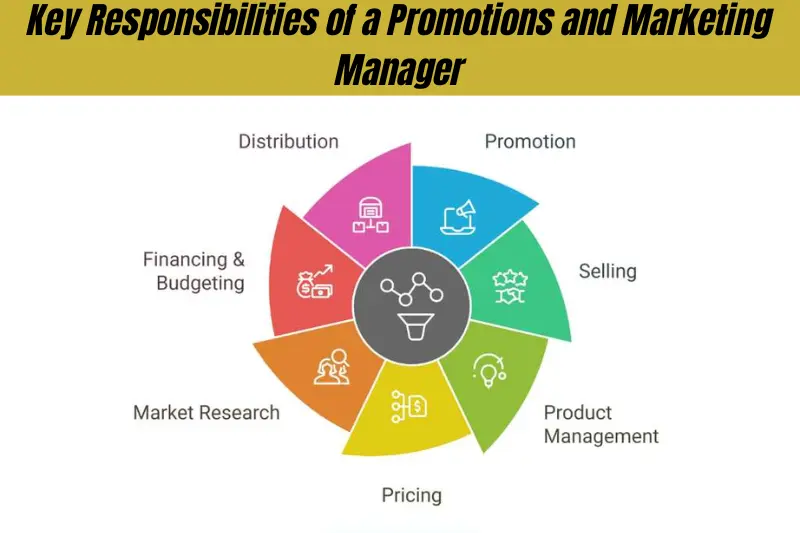In today’s competitive business landscape, companies rely heavily on effective marketing to stand out and drive growth. At the heart of these efforts is the promotions and marketing manager, a dynamic professional responsible for designing and executing promotional campaigns that capture attention and deliver results. From planning strategic marketing initiatives to coordinating with cross-functional teams, this role combines creativity, analytical thinking, and leadership. Whether you’re aspiring to step into this career or looking to understand how it contributes to business success, this guide will provide a comprehensive overview of the responsibilities, skills, and career path of a promotions and marketing manager.
What is a Promotions and Marketing Manager?

A promotions and marketing manager is a professional responsible for planning, executing, and overseeing marketing campaigns and promotional activities that drive brand awareness, generate leads, and boost sales. This role sits at the intersection of creativity, strategy, and business development, ensuring that a company’s products or services reach the right audience effectively.
Unlike a general marketing manager, who may focus on overall brand strategy, a promotions and marketing manager often zeroes in on specific campaigns, events, and promotions. They coordinate with multiple teams—including sales, design, and digital marketing—to create cohesive campaigns that deliver measurable results.
Key Functions Include:
- Campaign Planning: Developing marketing and promotional strategies tailored to target audiences.
- Execution: Managing the rollout of advertising campaigns, social media promotions, email marketing, and events.
- Analysis: Monitoring campaign performance and using data to optimize future marketing efforts.
- Collaboration: Working closely with sales and creative teams to ensure consistent messaging and impactful promotions.
In short, a promotions and marketing manager bridges the gap between creative ideas and business results, making them a crucial part of any company’s growth strategy.
Key Responsibilities of a Promotions and Marketing Manager

A promotions and marketing manager plays a vital role in driving a company’s marketing success. Their responsibilities go beyond creating attractive campaigns—they ensure that every promotional activity aligns with business objectives and delivers measurable results.
Planning and Executing Marketing Campaigns
- Developing strategic promotional campaigns for products, services, or events.
- Coordinating with creative, sales, and digital teams to ensure cohesive campaign messaging.
- Scheduling campaigns across multiple channels, including social media, email, print, and events.
Monitoring and Analyzing Campaign Performance
- Tracking the effectiveness of marketing campaigns using analytics tools.
- Measuring ROI (Return on Investment) and adjusting strategies based on data insights.
Preparing reports for stakeholders to highlight successes and areas for improvement.
Managing Promotional Events
- Organizing product launches, trade shows, or special promotions.
- Ensuring events are aligned with brand messaging and marketing objectives.
- Collaborating with vendors, partners, and internal teams to execute seamless events.
Team Leadership and Collaboration
- Leading marketing and promotions teams to achieve campaign goals.
- Coordinating cross-functional efforts between sales, design, and digital marketing teams.
- Mentoring team members to enhance their skills and efficiency.
Staying Updated with Marketing Trends
- Keeping abreast of the latest trends in digital marketing, social media, and promotions.
- Applying innovative strategies to maintain a competitive edge in the market.
A promotions and marketing manager’s responsibilities are diverse and require a balance of creativity, analytical thinking, and leadership. By managing campaigns from planning to execution, they ensure that every marketing effort contributes directly to a company’s growth.
Essential Skills for a Promotions and Marketing Manager
To excel as a promotions and marketing manager, professionals need a combination of creative, analytical, and leadership skills. These abilities ensure that campaigns are not only innovative but also effective in achieving business goals.
Communication Skills
- Clear and persuasive communication is critical for conveying marketing messages across campaigns.
- Effective collaboration with internal teams, clients, and vendors ensures smooth execution of promotions.
- Writing, presenting, and storytelling skills help in crafting compelling campaigns.
Creativity and Strategic Thinking
- Developing unique and engaging promotional campaigns requires out-of-the-box thinking.
- Strategic planning ensures campaigns align with business objectives and target audiences.
- Creativity is essential for differentiating a brand in a crowded marketplace.
Analytical and Data-Driven Skills
- Ability to interpret marketing metrics and campaign analytics to make informed decisions.
- Understanding ROI, conversion rates, and customer engagement metrics guides future campaigns.
- Familiarity with tools like Google Analytics, CRM platforms, and marketing automation software is highly valuable.
Leadership and Team Management
- Leading marketing teams effectively to meet deadlines and achieve goals.
- Delegating tasks, motivating team members, and resolving conflicts ensure smooth campaign execution.
- Mentorship and training help develop junior team members’ skills.
Digital Marketing Expertise
- Knowledge of social media marketing, email campaigns, SEO, and paid advertising is crucial.
- Staying updated on digital trends helps leverage emerging channels for promotions.
- Understanding online consumer behavior aids in creating targeted and effective campaigns.
By combining these skills, a promotions and marketing manager can craft campaigns that are creative, measurable, and impactful, driving tangible results for the company.
Educational Requirements and Career Path
Becoming a successful promotions and marketing manager requires a blend of formal education, practical experience, and ongoing professional development. Understanding the educational background and potential career trajectory helps aspiring professionals plan their path effectively.
Educational Background
- Bachelor’s Degree: Most promotions and marketing managers hold a degree in marketing, business administration, communications, or a related field.
- Specialized Courses: Coursework in advertising, consumer behavior, digital marketing, and sales strategies provides a strong foundation.
- Certifications (Optional but Valuable): Certifications from recognized institutions such as Google Ads, HubSpot, or the American Marketing Association (AMA) can enhance skills and improve employability.
Entry-Level Positions
Before stepping into a managerial role, most professionals gain experience in entry-level positions, such as:
- Marketing Coordinator
- Promotions Assistant
- Social Media or Digital Marketing Associate
These roles help build practical experience in campaign planning, market research, and promotional execution.
Mid-Level Positions
After gaining experience, professionals can advance to roles like:
- Marketing Manager
- Promotions Manager
- Brand Manager
At this stage, responsibilities expand to include team management, budget oversight, and strategic planning.
Senior-Level Opportunities
With substantial experience and proven success, a promotions and marketing manager can progress to senior-level roles, such as:
- Marketing Director
- Head of Promotions
- Chief Marketing Officer (CMO)
These positions involve shaping overall marketing strategy, managing large teams, and driving major business initiatives.
Continuous Learning and Skill Development
- Staying updated with marketing trends, digital tools, and consumer behavior is critical.
- Attending workshops, webinars, and professional conferences helps maintain a competitive edge.
By combining education, hands-on experience, and continuous skill development, aspiring professionals can build a rewarding career as a promotions and marketing manager.
Tips to Excel as a Promotions and Marketing Manager
Thriving as a promotions and marketing manager requires more than just education and experience. To stand out and achieve measurable results, professionals must adopt best practices, stay updated with trends, and continually refine their skills.
Stay Updated with Marketing Trends
- Follow industry news, blogs, and publications to remain informed about emerging tools, platforms, and strategies.
- Adapt campaigns to leverage new marketing channels such as social media trends, influencer collaborations, and digital innovations.
Leverage Data and Analytics
- Use analytics tools to track campaign performance, measure ROI, and identify areas for improvement.
- Make data-driven decisions to optimize marketing strategies and increase overall effectiveness.
Enhance Communication and Collaboration Skills
- Maintain clear communication with internal teams, clients, and vendors to ensure smooth execution of campaigns.
- Foster collaboration between departments such as sales, design, and digital marketing to create cohesive strategies.
Focus on Creativity and Innovation
- Think outside the box when developing campaigns to make them memorable and impactful.
- Experiment with creative formats, messaging, and promotional methods to engage target audiences effectively.
Prioritize Time Management and Organization
- Plan campaigns carefully to meet deadlines and manage multiple projects simultaneously.
- Use project management tools to streamline workflows and ensure tasks are completed efficiently.
Invest in Continuous Learning
- Attend workshops, webinars, and professional courses to expand knowledge and skills.
- Keep certifications updated and explore new areas of marketing, such as digital marketing or automation tools.
By combining strategic thinking, creativity, strong communication, and continuous learning, a promotions and marketing manager can excel in their role and deliver campaigns that drive significant business growth.
Common Challenges Faced by Promotions and Marketing Managers
While the role of a promotions and marketing manager is rewarding, it also comes with its own set of challenges. Understanding these obstacles can help professionals navigate them effectively and maintain successful campaigns.
Budget Constraints
- Limited marketing budgets often restrict the scope of promotional campaigns.
- Managers must prioritize initiatives, allocate resources efficiently, and find creative ways to maximize impact.
Measuring Campaign ROI
- Tracking the effectiveness of campaigns can be complex, especially across multiple channels.
- Promotions and marketing managers must rely on analytics, KPIs, and performance metrics to assess success accurately.
Balancing Creativity with Data-Driven Decisions
- Innovative campaigns need to be aligned with business goals and backed by data insights.
- Striking a balance between creative ideas and measurable outcomes is a continual challenge.
Coordinating Cross-Functional Teams
- Marketing often involves collaboration with sales, design, and digital teams.
- Ensuring clear communication, meeting deadlines, and resolving conflicts requires strong leadership and organizational skills.
Keeping Up with Rapid Industry Changes
- Marketing trends, tools, and consumer behaviors evolve rapidly.
- Managers must stay informed and adapt strategies quickly to remain competitive in the market.
Managing Customer Expectations
- Customers increasingly expect personalized and relevant experiences.
- Crafting campaigns that resonate with target audiences while managing expectations can be demanding.
Despite these challenges, a skilled promotions and marketing manager can navigate obstacles successfully by leveraging creativity, data, leadership, and adaptability, ultimately driving business growth and brand success.
Conclusion
The role of a promotions and marketing manager is both dynamic and impactful, combining creativity, strategic thinking, and leadership to drive business growth. From planning and executing marketing campaigns to analyzing performance and leading teams, these professionals play a central role in enhancing brand visibility and achieving measurable results.
Aspiring promotions and marketing managers should focus on developing a strong mix of skills, including communication, creativity, analytical thinking, and digital marketing expertise. Staying updated with industry trends, leveraging data, and continuously refining strategies are essential for long-term success.
By understanding the responsibilities, challenges, and career path of a promotions and marketing manager, individuals can position themselves to thrive in this fast-paced field and make a meaningful impact on their organization’s marketing efforts.

